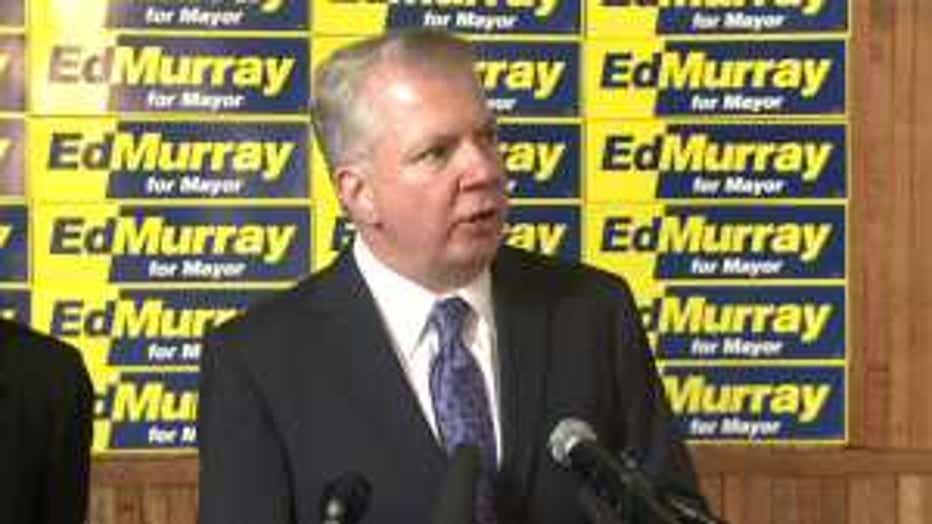Seattle's mayoral race: One-on-One with Ed Murray
SEATTLE -- One of the most heated races on the Nov. 5 ballot this year is the campaign for Seattle mayor. Mayor Mike McGinn is trying to fight off a strong challenge by Sen. Ed Murray, D-Seattle, a state legislator for 18 years who represents the Capitol Hill neighborhood.

What follows is a partial transcript of our interview with Murray. On Monday, we highlightedMcGinn.
Campaign Vision
C.R.: “A lot of people have looked you and said, hey, he’s running as the anti-McGinn, not as the pro-Ed Murray. They don’t think you have a clear vision for the future of the city.”
Murray: “I think they’re wrong, and I think the primary (election) proved that’s not true since I came in number one. We’ve talked about our transportation system. We’ve talked about an affordable city. We’ve talked about a government that needs to be effective. It’s one thing to be a progressive, it’s another to get results. We’ve talked about my ability to get results in Olympia vs. the mayor’s inability to get results in Seattle. And I think that’s a fair way to approach a campaign, to talk about what I’ve been able to do, what I would like to do, and what the mayor’s not been able to accomplish.”
Leadership Style
C.R.: “The reason a big transportation package did not happen this session in Olympia is because it died in the state Senate, your state Senate. What does that say about your leadership?”
Murray: “I don’t think that the responsibility for that package failing rests with me, it rests with some Republicans on the east side of the lake who are threatening their own constituents’ ability to get to work when they threaten bus service.”
C.R.: “But you talk about reaching across the aisle, why weren’t you able to reach across the aisle and get some of those suburban Republicans?”
Murray: “You know, you win, you lose. I passed the largest transportation package in state history when I chaired transportation. It restored funding for transit that had been eliminated by Tim Eyman. So, I’ve been fairly successful. But I’ve also lost. I lost the civil rights bill for 10 years before I won it. I lost marriage equality many years before I was able to win it. Usually it takes more than a year to move a package through.”
C.R.: “What’s your background, what skills do you bring to become that guy who can bring people together, to become that unifier?”
Murray: “I think legislators gain a set of skills where we have to work with people from the other party, we have to work with people from other parts of the state. So, to get things done, we know we have to find a way to come to some common agreement so that we can actually move things forward. I think that understanding of government, how government works, not just at the state level, but the local level and having worked with the federal delegation, that’s what I bring, that’s the difference.”
Police Reform
Murray has been critical of McGinn’s handling of police reform and the fact that the Department of Justice has had to enter the fray to force the Seattle Police Department to change its pattern of excessive force.
C.R.: “Is it really fair to blame the mayor for DOJ coming in, given that this is a long standing problem in the department?”
Murray: “Sure, because the Department of Justice approached the city and offered to work with the city. The Department of Justice did the same thing with the city of Austin (Texas). Austin cooperated, provided the data, made changes and that was the end of the story. This mayor decided to fight (U.S. Attorney) Jenny Durkan and the U.S. Attorney’s Office and the Justice Department year after year after year. He claims it’s because he needed to get his community commission, but the Justice Department, U.S. Attorney’s Office, they never opposed a community commission. So, yes, I believe we could have worked with them. It was a great opportunity. We had the federal government in, saying your police have a problem around race and around over-use of force. That would have been the opportunity for the mayor to say, great, let's work together, let’s get this done, let’s get it over.”
C.R.: “You believe a new chief is required to change things?”
Murray: “I do.”
C.R.: “And this mayor is not willing to do that? He’s said he would hire a new chief.”
Murray: “He has said that he would hire a new chief. I wonder if the chiefs around the country who would apply would look at the last four years and say, wow, I want to be part of that situation. I think they will look at it and back away. I think we need a new mayor so we can recruit the best candidates to get a new chief.”
City Hall Agenda
Murray: “I want this city to model how you deal with homelessness, how you deal with transportation, for the rest of the state, for the rest of the nation. Currently, what we model is how we, as Democrats, fight amongst ourselves to get anything done. That doesn’t have to be the case. You know, this is a Democratic, progressive city and I think we can bring folks together.”

